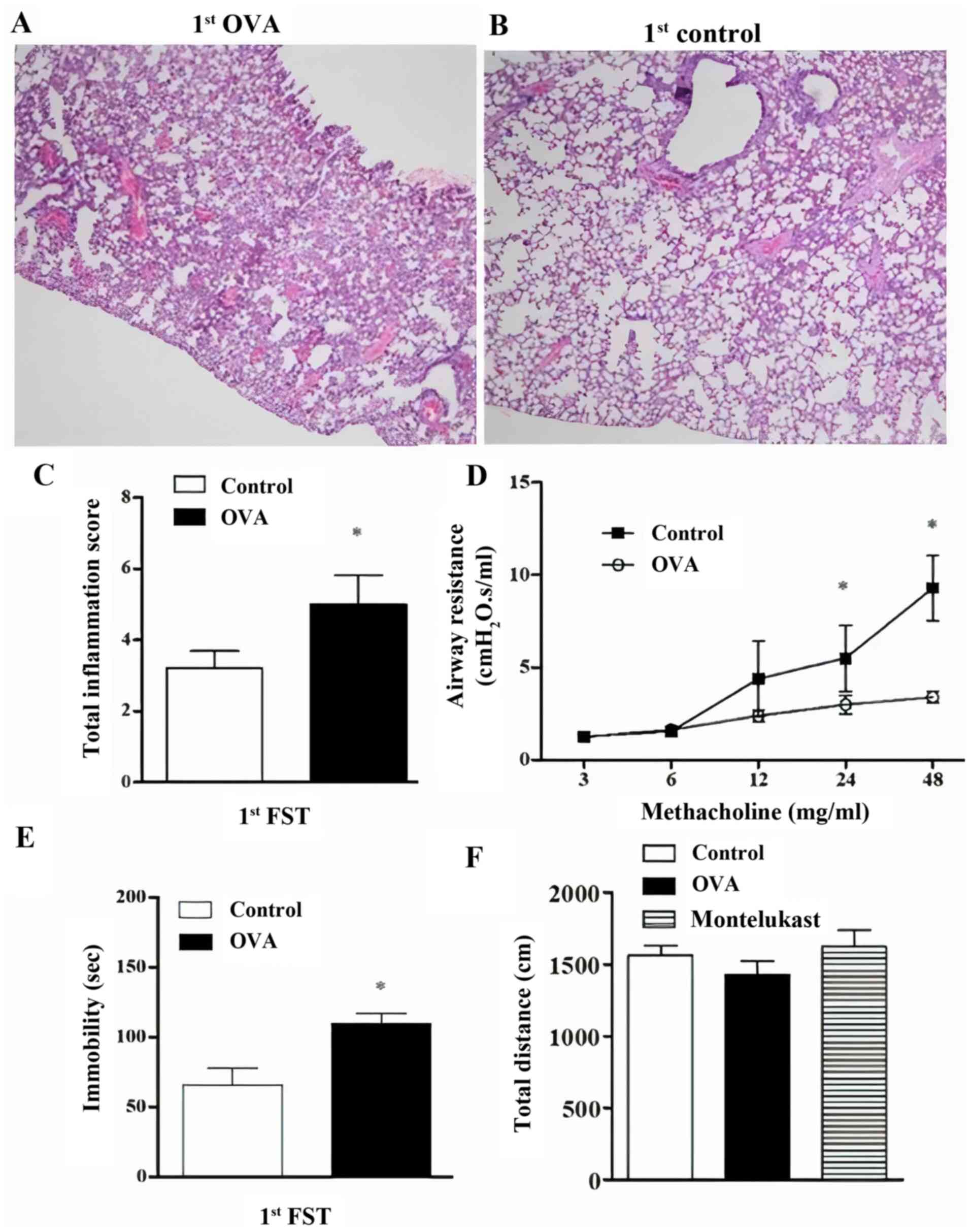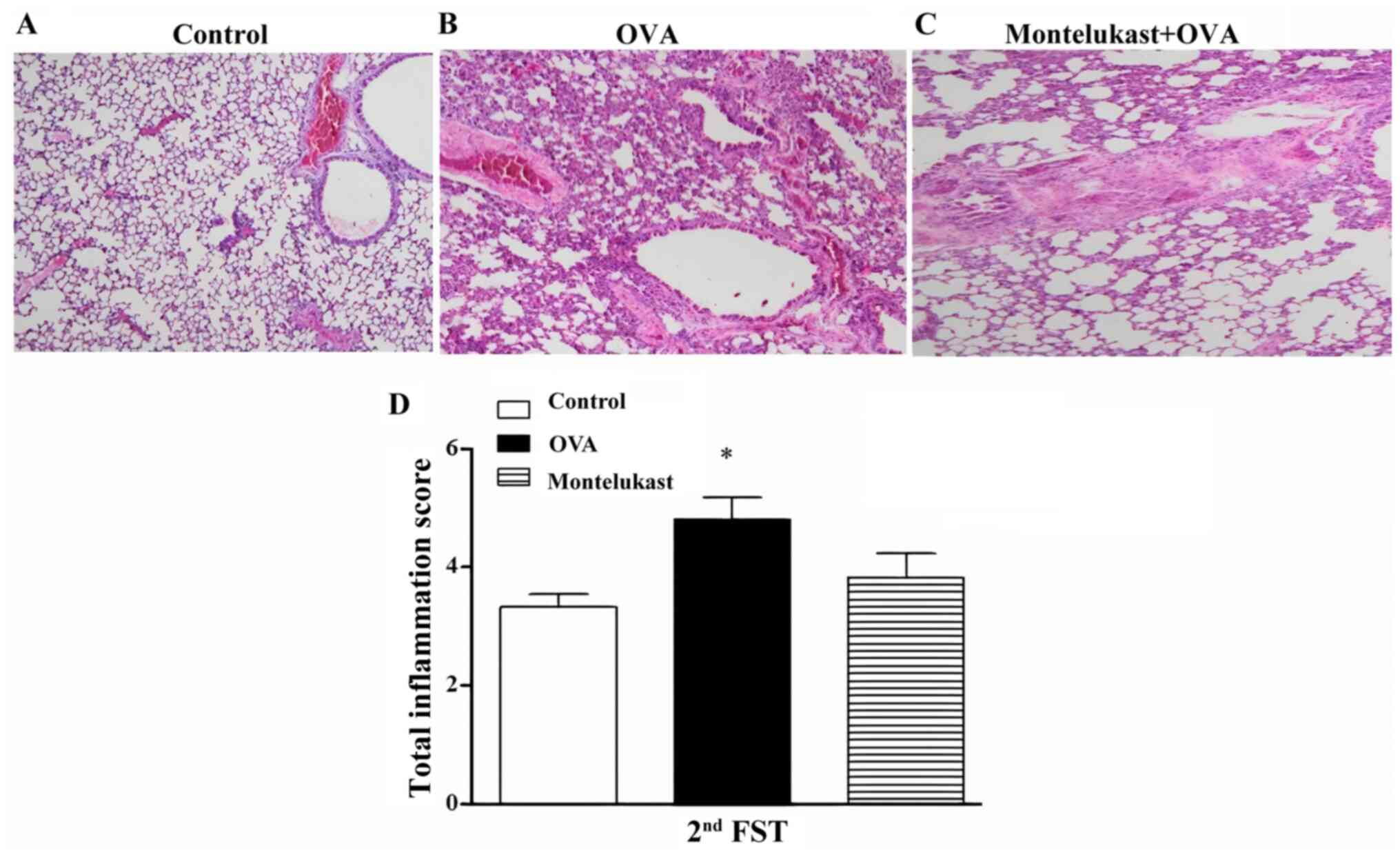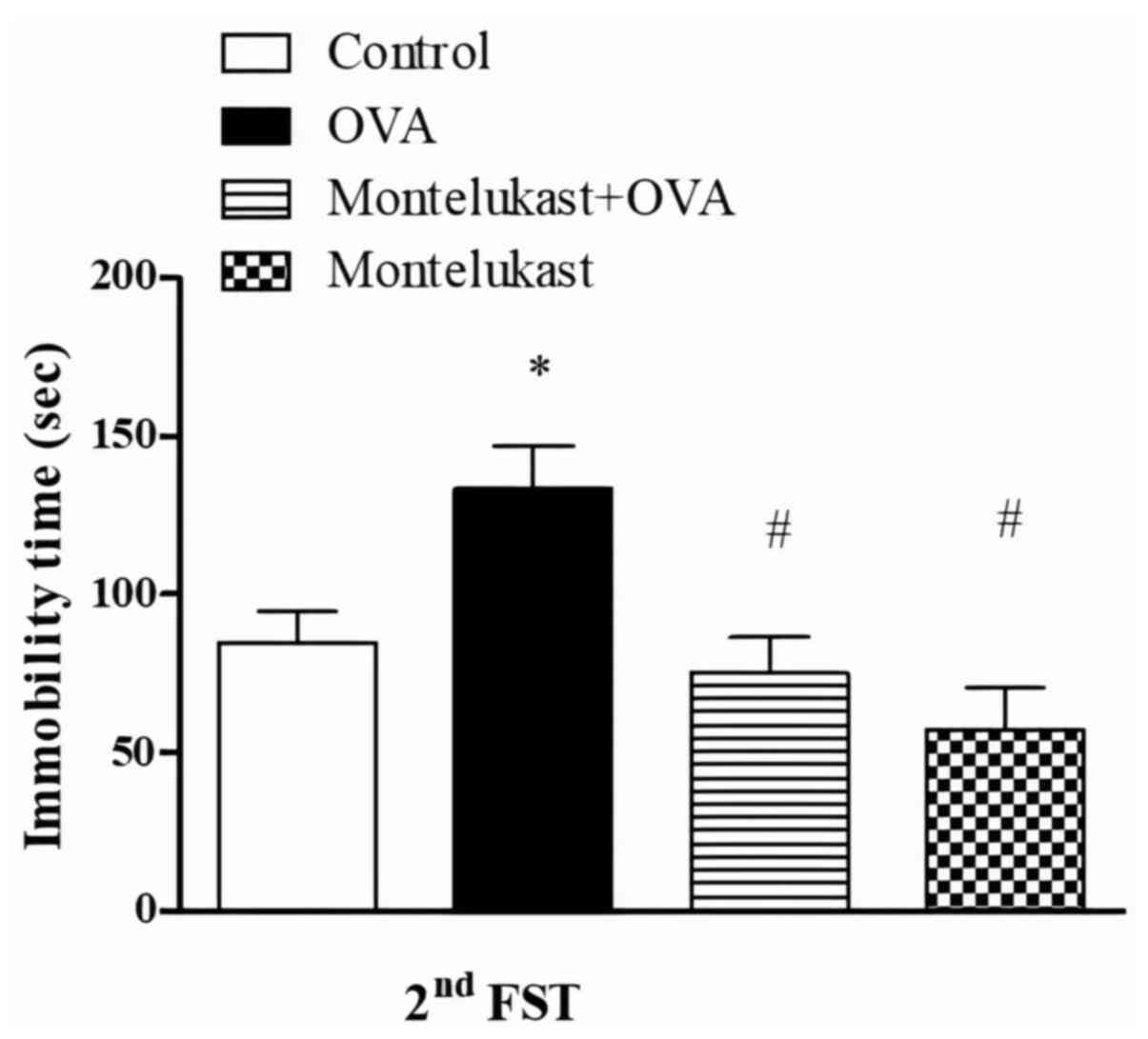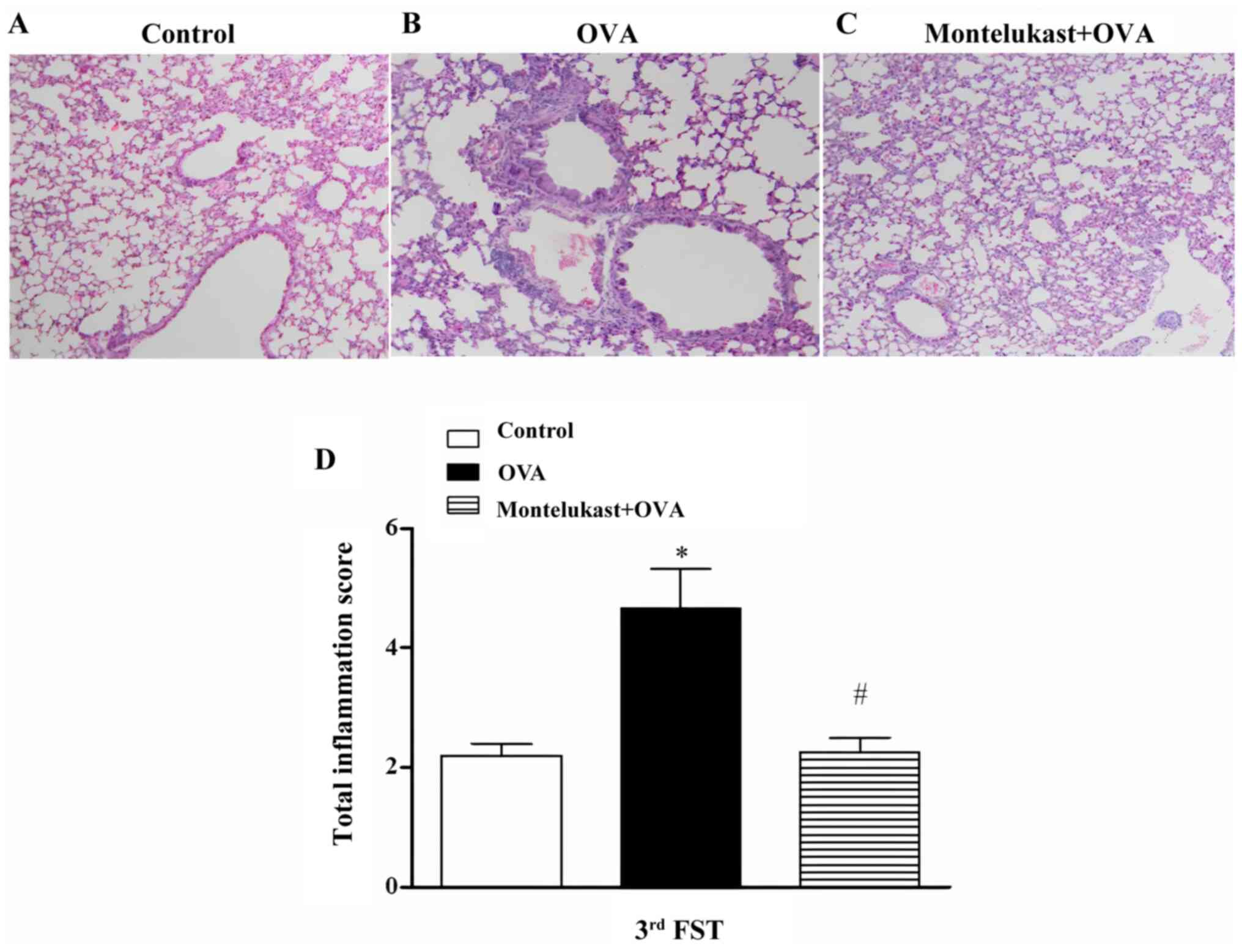|
1
|
Harris K, Kneale D, Lasserson TJ, McDonald
VM, Grigg J and Thomas J: School-based self-management
interventions for asthma in children and adolescents: A mixed
methods systematic review. Cochrane Database Syst Rev.
1(CD011651)2019.PubMed/NCBI View Article : Google Scholar
|
|
2
|
Pawankar R, Canonica GW, Holgate ST and
Lockey RF: Allergic diseases and asthma: A major global health
concern. Curr Opin Allergy Clin Immunol. 12:39–41. 2012.PubMed/NCBI View Article : Google Scholar
|
|
3
|
Woo LN, Guo WY, Wang X, Young A, Salehi S,
Hin A, Zhang Y, Scott JA and Chow CW: A 4-week model of house dust
mite (HDM) induced allergic airways inflammation with airway
remodeling. Sci Rep. 8(6925)2018.PubMed/NCBI View Article : Google Scholar
|
|
4
|
Barnes PJ: New therapies for asthma: Is
there any progress? Trends Pharmacol Sci. 31:335–343.
2010.PubMed/NCBI View Article : Google Scholar
|
|
5
|
Calapai G, Casciaro M, Miroddi M, Calapai
F, Navarra M and Gangemi S: Montelukast-induced adverse drug
reactions: A review of case reports in the literature.
Pharmacology. 94:60–70. 2014.PubMed/NCBI View Article : Google Scholar
|
|
6
|
Haarman MG, van Hunsel F and de Vries TW:
Adverse drug reactions of montelukast in children and adults.
Pharmacol Res Perspect. 5(e00341)2017.PubMed/NCBI View
Article : Google Scholar
|
|
7
|
Aldea Perona A, Garcia-Saiz M and Sanz
Alvarez E: Psychiatric disorders and montelukast in children: A
disproportionality analysis of the VigiBase((R)). Drug Saf.
39:69–78. 2016.PubMed/NCBI View Article : Google Scholar
|
|
8
|
Benard B, Bastien V, Vinet B, Yang R,
Krajinovic M and Ducharme FM: Neuropsychiatric adverse drug
reactions in children initiated on montelukast in real-life
practice. Eur Respir J. 50(1700148)2017.PubMed/NCBI View Article : Google Scholar
|
|
9
|
urihttps://ginasthma.org/wp-content/uploads/2020/04/GINA-2020-full-report_-final-_wms.pdfsimplehttps://ginasthma.org/wp-content/uploads/2020/04/GINA-2020-full-report_-final-_wms.pdf.
|
|
10
|
FDA: Early Communication About an Ongoing
Safety Review of Montelukast (Singulair). 3/23/2008 04/18/2013
8/7/2018]; Available from: urihttps://wayback.archive-it.org/7993/20170112033551/http:/www.fda.gov/Drugs/DrugSafety/PostmarketDrugSafetyInformationforPatientsandProviders/DrugSafetyInformationforHeathcareProfessionals/ucm070618.htmsimplehttps://wayback.archive-it.org/7993/20170112033551/http:/www.fda.gov/Drugs/DrugSafety/PostmarketDrugSafetyInformationforPatientsandProviders/DrugSafetyInformationforHeathcareProfessionals/ucm070618.htm.
|
|
11
|
FDA: Updated Information on Leukotriene
Inhibitors: Montelukast (marketed as Singulair), Zafirlukast
(marketed as Accolate), and Zileuton (marketed as Zyflo and Zyflo
CR). 8/28/2009 07/08/2015; urihttps://wayback.archive-it.org/7993/20170111080414/http://www.fda.gov/Drugs/DrugSafety/PostmarketDrugSafetyInformationforPatientsandProviders/DrugSafetyInformationforHeathcareProfessionals/ucm165489.htmsimplehttps://wayback.archive-it.org/7993/20170111080414/http://www.fda.gov/Drugs/DrugSafety/PostmarketDrugSafetyInformationforPatientsandProviders/DrugSafetyInformationforHeathcareProfessionals/ucm165489.htm.
|
|
12
|
FDA. SINGULAIR® (Montelukast
sodium) Tablets, Chewable Tablets, And Oral Granules 8/19/2009;
Available from: urihttps://www.accessdata.fda.gov/drugsatfda_docs/label/2009/020829s051_020830s052_021409s028lbl.pdfsimplehttps://www.accessdata.fda.gov/drugsatfda_docs/label/2009/020829s051_020830s052_021409s028lbl.pdf.
|
|
13
|
Manalai P, Woo JM and Postolache TT:
Suicidality and montelukast. Expert Opin Drug Saf. 8:273–282.
2009.PubMed/NCBI View Article : Google Scholar
|
|
14
|
Schumock GT, Stayner LT, Valuck RJ, Joo
MJ, Gibbons RD and Lee TA: Risk of suicide attempt in asthmatic
children and young adults prescribed leukotriene-modifying agents:
A nested case-control study. J Allergy Clin Immunol. 130:368–375.
2012.PubMed/NCBI View Article : Google Scholar
|
|
15
|
Postolache TT, Komarow H and Tonelli LH:
Allergy: A risk factor for suicide? Curr Treat Options Neurol.
10:363–376. 2008.PubMed/NCBI View Article : Google Scholar
|
|
16
|
Hurwitz EL and Morgenstern H:
Cross-sectional associations of asthma, hay fever, and other
allergies with major depression and low-back pain among adults aged
20-39 years in the United States. Am J Epidemiol. 150:1107–1116.
1999.PubMed/NCBI View Article : Google Scholar
|
|
17
|
Addolorato G, Ancona C, Capristo E,
Graziosetto R, Di Rienzo L, Maurizi M and Gasbarrini G: State and
trait anxiety in women affected by allergic and vasomotor rhinitis.
J Psychosom Res. 46:283–289. 1999.PubMed/NCBI View Article : Google Scholar
|
|
18
|
Trojan TD, Khan DA, Defina LF, Akpotaire
O, Goodwin RD and Brown ES: Asthma and depression: The cooper
center longitudinal study. Ann Allergy Asthma Immunol. 112:432–436.
2014.PubMed/NCBI View Article : Google Scholar
|
|
19
|
Oraka E, King ME and Callahan DB: Asthma
and serious psychological distress: Prevalence and risk factors
among US adults, 2001-2007. Chest. 137:609–616. 2010.PubMed/NCBI View Article : Google Scholar
|
|
20
|
Wong KO, Rowe BH, Douwes J and
Senthilselvan A: Asthma and wheezing are associated with depression
and anxiety in adults: An analysis from 54 countries. Pulm Med.
2013(929028)2013.PubMed/NCBI View Article : Google Scholar
|
|
21
|
Jiang M, Qin P and Yang X: Comorbidity
between depression and asthma via immune-inflammatory pathways: A
meta-analysis. J Affect Disord. 166:22–29. 2014.PubMed/NCBI View Article : Google Scholar
|
|
22
|
Katon W, Lozano P, Russo J, McCauley E,
Richardson L and Bush T: The prevalence of DSM-IV anxiety and
depressive disorders in youth with asthma compared with controls. J
Adolesc Health. 41:455–463. 2007.PubMed/NCBI View Article : Google Scholar
|
|
23
|
urihttp://eurlex.europa.eu/LexUriServ/LexUriServ.do?uri=OJ:L:2010:276:0033:0079:En:PDFsimpleeurlex.europa.eu/LexUriServ/LexUriServ.do?uri=OJ:L:2010:276:0033:0079:En:PDF.
|
|
24
|
Swedin L, Ellis R, Kemi C, Ryrfeldt A,
Inman M, Dahlén SE and Adner M: Comparison of aerosol and
intranasal challenge in a mouse model of allergic airway
inflammation and hyperresponsiveness. Int Arch Allergy Immunol.
153:249–258. 2010.PubMed/NCBI View Article : Google Scholar
|
|
25
|
Porsolt RD, Bertin A and Jalfre M:
Behavioral despair in mice: A primary screening test for
antidepressants. Arch Int Pharmacodyn Ther. 229:327–336.
1977.PubMed/NCBI
|
|
26
|
Porsolt RD, Le Pichon M and Jalfre M:
Depression: A new animal model sensitive to antidepressant
treatments. Nature. 266:730–732. 1977.PubMed/NCBI View
Article : Google Scholar
|
|
27
|
Painsipp E, Wultsch T, Edelsbrunner ME,
Tasan RO, Singewald N, Herzog H and Holzer P: Reduced anxiety-like
and depression-related behavior in neuropeptide Y Y4 receptor
knockout mice. Genes Brain Behav. 7:532–542. 2008.PubMed/NCBI View Article : Google Scholar
|
|
28
|
Brunner SM, Farzi A, Locker F, Holub BS,
Drexel M, Reichmann F, Lang AA, Mayr JA, Vilches JJ, Navarro X, et
al: GAL3 receptor KO mice exhibit an anxiety-like phenotype. Proc
Natl Acad Sci USA. 111:7138–7143. 2014.PubMed/NCBI View Article : Google Scholar
|
|
29
|
British Thoracic Society; Scottish
Intercollegiate Guidelines Network. British guideline on the
management of asthma. Thorax. 69 (Suppl 1):1–192. 2014.PubMed/NCBI
|
|
30
|
Aun MV, Bonamichi-Santos R, Arantes-Costa
FM, Kalil J and Giavina-Bianchi P: Animal models of asthma: Utility
and limitations. J Asthma Allergy. 10:293–301. 2017.PubMed/NCBI View Article : Google Scholar
|
|
31
|
Zhao JJ, Rogers JD, Holland SD, Larson P,
Amin RD, Haesen R, Freeman A, Seiberling M, Merz M and Cheng H:
Pharmacokinetics and bioavailability of montelukast sodium
(MK-0476) in healthy young and elderly volunteers. Biopharm Drug
Dispos. 18:769–777. 1997.PubMed/NCBI View Article : Google Scholar
|
|
32
|
Marschallinger J, Krampert M,
Couillard-Despres S, Heuchel R, Bogdahn U and Aigner L:
Age-dependent and differential effects of Smad7DEx1 on neural
progenitor cell proliferation and on neurogenesis. Exp Gerontol.
57:149–154. 2014.PubMed/NCBI View Article : Google Scholar
|
|
33
|
Brunner WM, Schreiner PJ, Sood A and
Jacobs DR Jr: Depression and risk of incident asthma in adults. The
CARDIA study. Am J Respir Crit Care Med. 189:1044–1051.
2014.PubMed/NCBI View Article : Google Scholar
|
|
34
|
de Miguel Diez J, Hernández Barrera V,
Puente Maestu L, Carrasco Garrido P, Gómez García T and Jiménez
García R: Psychiatric comorbidity in asthma patients. Associated
factors. J Asthma. 48:253–258. 2011.PubMed/NCBI View Article : Google Scholar
|
|
35
|
Di Marco F, Santus P and Centanni S:
Anxiety and depression in asthma. Curr Opin Pulm Med. 17:39–44.
2011.PubMed/NCBI View Article : Google Scholar
|
|
36
|
Gerald JK and Moreno FA: Asthma and
depression: It's complicated. J Allergy Clin Immunol Pract.
4:74–75. 2016.PubMed/NCBI View Article : Google Scholar
|
|
37
|
Petit-Demouliere B, Chenu F and Bourin M:
Forced swimming test in mice: A review of antidepressant activity.
Psychopharmacology (Berl). 177:245–255. 2005.PubMed/NCBI View Article : Google Scholar
|
|
38
|
Kara NZ, Stukalin Y and Einat H:
Revisiting the validity of the mouse forced swim test: Systematic
review and meta-analysis of the effects of prototypic
antidepressants. Neurosci Biobehav Rev. 84:1–11. 2018.PubMed/NCBI View Article : Google Scholar
|
|
39
|
Slattery DA and Cryan JF: Using the rat
forced swim test to assess antidepressant-like activity in rodents.
Nat Protoc. 7:1009–1014. 2012.PubMed/NCBI View Article : Google Scholar
|
|
40
|
Slattery DA and Cryan JF: The ups and
downs of modelling mood disorders in rodents. ILAR J. 55:297–309.
2014.PubMed/NCBI View Article : Google Scholar
|
|
41
|
Van Lieshout RJ, Bienenstock J and
MacQueen GM: A review of candidate pathways underlying the
association between asthma and major depressive disorder. Psychosom
Med. 71:187–195. 2009.PubMed/NCBI View Article : Google Scholar
|
|
42
|
Gao YH, Zhao HS, Zhang FR, Gao Y, Shen P,
Chen RC and Zhang GJ: The relationship between depression and
asthma: A meta-analysis of prospective studies. PLoS One.
10(e0132424)2015.PubMed/NCBI View Article : Google Scholar
|
|
43
|
Postolache TT, Langenberg P, Zimmerman SA,
Lapidus M, Komarow H, McDonald JS, Furst N, Dzhanashvili N,
Scrandis D, Bai J, et al: Changes in severity of allergy and
anxiety symptoms are positively correlated in patients with
recurrent mood disorders who are exposed to seasonal peaks of
aeroallergens. Int J Child Health Hum Dev. 1:313–322.
2008.PubMed/NCBI
|
|
44
|
Goodwin RD and Eaton WW: Asthma, suicidal
ideation, and suicide attempts: Findings from the Baltimore
epidemiologic catchment area follow-up. Am J Public Health.
95:717–722. 2005.PubMed/NCBI View Article : Google Scholar
|
|
45
|
Loerbroks A, Gadinger MC, Bosch JA,
Stürmer T and Amelang M: Work-related stress, inability to relax
after work and risk of adult asthma: A population-based cohort
study. Allergy. 65:1298–1305. 2010.PubMed/NCBI View Article : Google Scholar
|
|
46
|
Uz T, Dwivedi Y, Pandey GN, Roberts RC,
Conley RR, Manev R and Manev H: 5-Lipoxygenase in the prefrontal
cortex of suicide victims. Open Neuropsychopharmacol J. 1:1–5.
2008.PubMed/NCBI View Article : Google Scholar
|
|
47
|
Zuo HX, Li JQ, Han B, Ke CJ, Liu XD, Zhang
YC, Li L and Yang X: Di-(n-butyl)-phthalate-induced oxidative
stress and depression-like behavior in mice with or without
ovalbumin immunization. Biomed Environ Sci. 27:268–280.
2014.PubMed/NCBI View Article : Google Scholar
|
|
48
|
Neamati A, Chaman F, Hosseini M and
Boskabady MH: The effects of Valeriana officinalis L.
hydro-alcoholic extract on depression like behavior in ovalbumin
sensitized rats. J Pharm Bioallied Sci. 6:97–103. 2014.PubMed/NCBI View Article : Google Scholar
|
|
49
|
Lynch KR, O'Neill GP, Liu Q, Im DS, Sawyer
N, Metters KM, Coulombe N, Abramovitz M, Figueroa DJ, Zeng Z, et
al: Characterization of the human cysteinyl leukotriene CysLT1
receptor. Nature. 399:789–793. 1999.PubMed/NCBI View
Article : Google Scholar
|
|
50
|
Jones TR and Rodger IW: Role of
leukotrienes and leukotriene receptor antagonists in asthma. Pulm
Pharmacol Ther. 12:107–110. 1999.PubMed/NCBI View Article : Google Scholar
|
|
51
|
de Vries TW and van Hunsel F: Adverse drug
reactions of systemic antihistamines in children in the
netherlands. Arch Dis Child. 101:968–970. 2016.PubMed/NCBI View Article : Google Scholar
|
|
52
|
Callero-Viera A, Infante S,
Fuentes-Aparicio V, Zapatero L and Alonso-Lebrero E:
Neuropsychiatric reactions to montelukast. J Investig Allergol Clin
Immunol. 22:452–453. 2012.PubMed/NCBI
|
|
53
|
Alkhuja S, Gazizov N and Alexander ME:
Sleeptalking! Sleepwalking! Side effects of montelukast. Case Rep
Pulmonol. 2013(813786)2013.PubMed/NCBI View Article : Google Scholar
|
|
54
|
Ali MM, O'Brien CE, Cleves MA and Martin
BC: Exploring the possible association between montelukast and
neuropsychiatric events among children with asthma: A matched
nested case-control study. Pharmacoepidemiol Drug Saf. 24:435–445.
2015.PubMed/NCBI View Article : Google Scholar
|
|
55
|
Holbrook JT and Harik-Khan R: Montelukast
and emotional well-being as a marker for depression: Results from 3
randomized, double-masked clinical trials. J Allergy Clin Immunol.
122:828–829. 2008.PubMed/NCBI View Article : Google Scholar
|
|
56
|
Philip G, Hustad C, Noonan G, Malice MP,
Ezekowitz A, Reiss TF and Knorr B: Reports of suicidality in
clinical trials of montelukast. J Allergy Clin Immunol. 124:691–696
e6. 2009.PubMed/NCBI View Article : Google Scholar
|
|
57
|
Philip G, Hustad CM, Malice MP, Noonan G,
Ezekowitz A, Reiss TF and Knorr B: Analysis of behavior-related
adverse experiences in clinical trials of montelukast. J Allergy
Clin Immunol. 124:699–706 e8. 2009.PubMed/NCBI View Article : Google Scholar
|




















